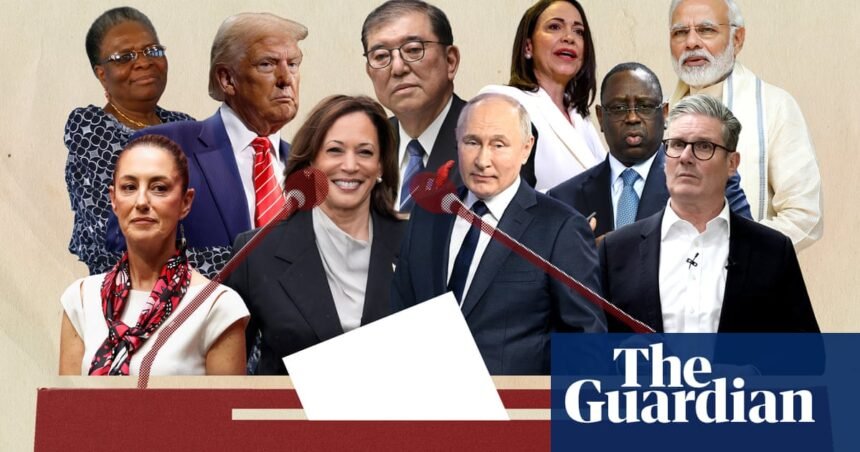More than 80 countries are heading to the polls in 2024, including some of the wealthiest and most powerful, the most populous, the most authoritarian, and the most fragile. Many elections will test the limits of democracy, while others will serve as mere rubber-stamping exercises. Some will face boycotts by opposition groups or be undermined by government crackdowns on the press and dissent. Keep track of all the results and upcoming polls with our election tracker:
January
BHUTAN
30 November 2023 – 9 January 2024: The tiny Himalayan kingdom has elected the liberal former prime minister Tshering Tobgay and his People’s Democratic Party (PDP) with a large majority. Tobgay has promised to promote investment to boost the country’s $3 billion economy and tackle rising unemployment that has driven many young Bhutanese abroad, mainly to Australia, in search of better opportunities.
BANGLADESH
7 January: Prime minister Sheikh Hasina secured a fifth term in office during an election overshadowed by a brutal crackdown on the opposition, resulting in a low voter turnout of just 40%. Prior to the election, tens of thousands of opposition leaders and party members were arrested, with at least nine dying in jail over the three months leading up to the election. Hasina previously fled the country following mass protests in August 2023.
TAIWAN
13 January: Taiwan elected Lai Ching-te as its next president, marking a historic third term for the pro-sovereignty Democratic Progressive Party (DPP) and provoking anger from Beijing. Following the elections, China reduced Taiwan’s formal diplomatic allies to just 12 and increased military threats, with warplanes frequently entering Taiwanese airspace.
COMOROS
14 January: President Azali Assoumani won a fourth five-year term more than two decades after first coming to power through a coup. While the country experienced three democratic transitions after he stepped down in 2006, his recent elections have eroded democratic mechanisms. Opposition candidates alleged fraud and ballot-stuffing following this vote.
TUVALU
26 January: Feleti Teo, a former attorney general and fisheries official, was elected as prime minister by MPs after general elections closely watched by Taiwan, China, the US, and Australia amid a geopolitical tussle for influence in the Pacific. Teo reaffirmed the country’s strong relationship with Taiwan post-election.
FINLAND
28 January – 11 February: Former prime minister Alexander Stubb won a runoff election against rival Pekka Haavisto in Finland’s most high-stakes presidential election in a generation, occurring as geopolitical tensions rose with Russia.
February
EL SALVADOR
4 February: President Nayib Bukele achieved a commanding victory amid a strengthened crackdown on gangs, transforming security in a country previously known for violence. However, his New Ideas party’s sweeping parliamentary win raises concerns regarding constitutional legitimacy and civil liberties.
MALI
Elections originally scheduled for 4 February are now postponed, reflecting the junta’s intent to hold onto power indefinitely amidst escalating terrorist violence.
AZERBAIJAN
7 February: President Ilham Aliyev won a fifth term amid accusations of an unfair electoral process, having called the election early following military successes in the Nagorno-Karabakh region.
HAITI
Elections initially due by 7 February 2024 have faced delays and instability since the assassination of President Jovenel Moïse in 2021, leaving no elected officials in place and rampant violence from gang leaders.
PAKISTAN
8 February: The PTI party of imprisoned former prime minister Imran Khan emerged with the most votes in legislative elections, but a coalition, including rival parties, formed the next government to block PTI from power.
INDONESIA
14 February: Former general Prabowo Subianto seemed poised to win the presidential election, raising concerns among rights activists regarding potential accountability for past human rights abuses.
BELARUS
25 February: Parliamentary elections seen as a sham resulted in no surprises, further entrenching President Alexander Lukashenko’s authoritarian regime.
CAMBODIA
25 February: The ruling Cambodian People’s Party claimed a landslide victory in Senate elections, paving the way for former prime minister Hun Sen’s political return.
March
IRAN
1 March: Elections for the parliament and Assembly of Experts saw a turnout of merely 41%, reflecting widespread disillusionment with the clerical establishment amid mounting economic troubles.
PORTUGAL
10 March: Portugal’s centre-right Democratic Alliance narrowly ousted the Socialist government in a snap election which revealed rising support for far-right parties.
RUSSIA
15-17 March: Vladimir Putin claimed a sweeping victory in presidential elections widely condemned as a sham, as the elections were characterized by the absence of genuine opposition.
SLOVAKIA
23 March: Nationalist-left candidate Peter Pellegrini won the presidential election, solidifying the pro-Moscow government’s power after the recent political turbulence.
SENEGAL
24 March: Bassirou Diomaye Faye became Senegal’s youngest president following a significant election win, promising systemic reforms after the previous administration’s long tenure.
UKRAINE
An election that was due by 31 March has been postponed under martial law, amidst the ongoing war and political tensions.
April
KUWAIT
4 April: Opposition candidates won 29 seats in the assembly elections, continuing the trend observed in previous elections amidst political party restrictions.
SOUTH KOREA
10 April: Liberal opposition parties achieved a significant win in parliamentary elections, marking a resounding defeat for the ruling conservative party.
CROATIA
17 April: The ruling HDZ party won parliamentary elections but without an absolute majority, reflecting waning public support amid corruption scandals.
SOLOMON ISLANDS
17 April: Lawmakers elected Jeremiah Manele as prime minister after parliamentary elections failed to produce a majority.
INDIA
19 April – 1 June: The ruling BJP lost its parliamentary majority, though it retained power in a coalition government, reflecting voter backlash against the prime minister’s policies.
MALDIVES
21 April: President Mohamed Muizzu’s party gained control of parliament in a significant election win, shifting foreign policy towards China.
TOGO
29 April: Incumbent president Faure Gnassingbe’s party won major parliamentary elections under controversial new rules, allowing him to maintain significant power.
May
PANAMA
5 May: José Raúl Mulino won presidential elections, stepping in for former president Ricardo Martinelli, who faced legal troubles.
CHAD
6 May: Mahamat Idriss Déby won the presidential election, extending the ruling family’s decades-long governance despite calls for a boycott.
THE DOMINICAN REPUBLIC
19 May: Incumbent Luis Abinader secured a strong victory in presidential elections based on post-Covid recovery efforts.
LITHUANIA
12-26 May: Incumbent president Gitanas Nausėda won a run-off election amid heightened concerns over regional security.
MADAGASCAR
29 May: Legislative elections proceeded with allegations of fraud and low turnout after recent presidential elections.
SOUTH AFRICA
29 May: The ANC lost its majority for the first time, initiating coalition talks amid public dissatisfaction.
June
ICELAND
1 June: Halla Tómasdóttir won the presidency in a largely ceremonial role, taking over in August.
MEXICO
2 June: Claudia Sheinbaum achieved a landmark victory to become Mexico’s first female president amid significant violence during the electoral process.
EUROPEAN PARLIAMENT
6-9 June: Populist right parties made gains in the European elections, prompting concerns over the stability of pro-European centers.
BELGIUM
9 June: Prime Minister Alexander De Croo resigned after significant losses in parliamentary elections.
BULGARIA
9 June: The conservative party emerged as the largest in a snap election amid ongoing political instability.
MAURITANIA
22 June: President Mohamed Ould Ghazouani won re-election amid significant accusations of electoral irregularities.
MONGOLIA
28 June: The ruling party lost its significant majority in parliament, reflecting widespread discontent with governance.
July
UNITED KINGDOM
4 July: Labour leader Keir Starmer gained power, ending 14 years of Conservative rule amid mounting social issues.
IRAN
28 June-5 July: Reformist Masoud Pezeshkian won the presidency, indicating a desire for change amidst long-standing political repression.
FRANCE
30 June-7 July: A left-wing alliance unexpectedly secured the most parliamentary seats, reshaping France’s political landscape.
RWANDA
15 July: President Paul Kagame maintained near-total control in an election criticized for a lack of genuine opposition.
VENEZUELA
28 July: President Nicolás Maduro faced backlash and claims of election fraud amid large protests post-election.
BURKINA FASO
Elections scheduled for July were postponed for five years under the ruling junta, which has been accused of failing to address security issues.
SYRIA
15 July: Bashar Assad’s party maintained majority control in parliamentary elections characterized by significant criticism.
August
KIRIBATI
14-19 August: The country transitions its government after recent elections, leading to a new parliament expected to convene in September.
September
ALGERIA
7 September: President Abdulmadjid Tebboune won re-election amid allegations of electoral fraud from his opponents.
SRI LANKA
21 September: Anura Kumara Dissanayake won the presidency, rejecting the old political elite amid widespread economic hardships.
AUSTRIA
29 September: A far-right party scored significant electoral gains, complicating coalition discussions.
October
TUNISIA
6 October: President Kais Saied secured a second term amid concerns over low turnout and political repression.
LITHUANIA
By 6 October: The Social Democratic Party led in the first round of parliamentary elections, expected to maintain a pro-western stance.
MOZAMBIQUE
9 October: Ruling party Frelimo appeared to win elections under contested circumstances as allegations of fraud surfaced.
MOLDOVA
20 October: President Maia Sandu is set to run for re-election amid potential Russian interference concerns.
GEORGIA
26 October: The ruling party faces challenges as it seeks to manage public fears of Russian influence.
JAPAN
27 October: Prime Minister Shigeru Ishiba called snap elections amid a series of scandals affecting the ruling party.
URUGUAY
27 October: General elections are highly anticipated as the current president cannot run again, setting the stage for a close race.
UZBEKISTAN
27 October: Legislative elections will be held amid ongoing governmental repression of dissent.
BOTSWANA
30 October: General elections are poised to be highly competitive, with various opposition parties gaining ground.
November
UNITED STATES
5 November: A significant shift occurred when Vice President Kamala Harris entered the presidential race amid tight polls.
SOMALILAND
13 November: Presidential elections have been postponed, leading to accusations aimed at the current administration.
NAMIBIA
27 November: The ruling party’s candidate may become the first female president in upcoming elections.
JORDAN
Parliamentary elections are expected in November without a fixed date.
SOUTH SUDAN
Elections previously due in late 2024 have been postponed to 2026, raising concerns over democratic progression.
MAURITIUS
30 November: The ruling party seeks to retain a parliamentary majority in upcoming elections.
December
GHANA
7 December: The country faces a major economic crisis ahead of significant presidential elections.
GUINEA-BISSAU
Presidential elections are anticipated without a set date, with uncertainties surrounding candidates and a prior dissolution of parliament.
GUINEA
Upcoming planned elections are seen as pivotal for restoring democracy after a coup.
Reuters, Associated Press, and Agence France-Presse contributed to this report.





